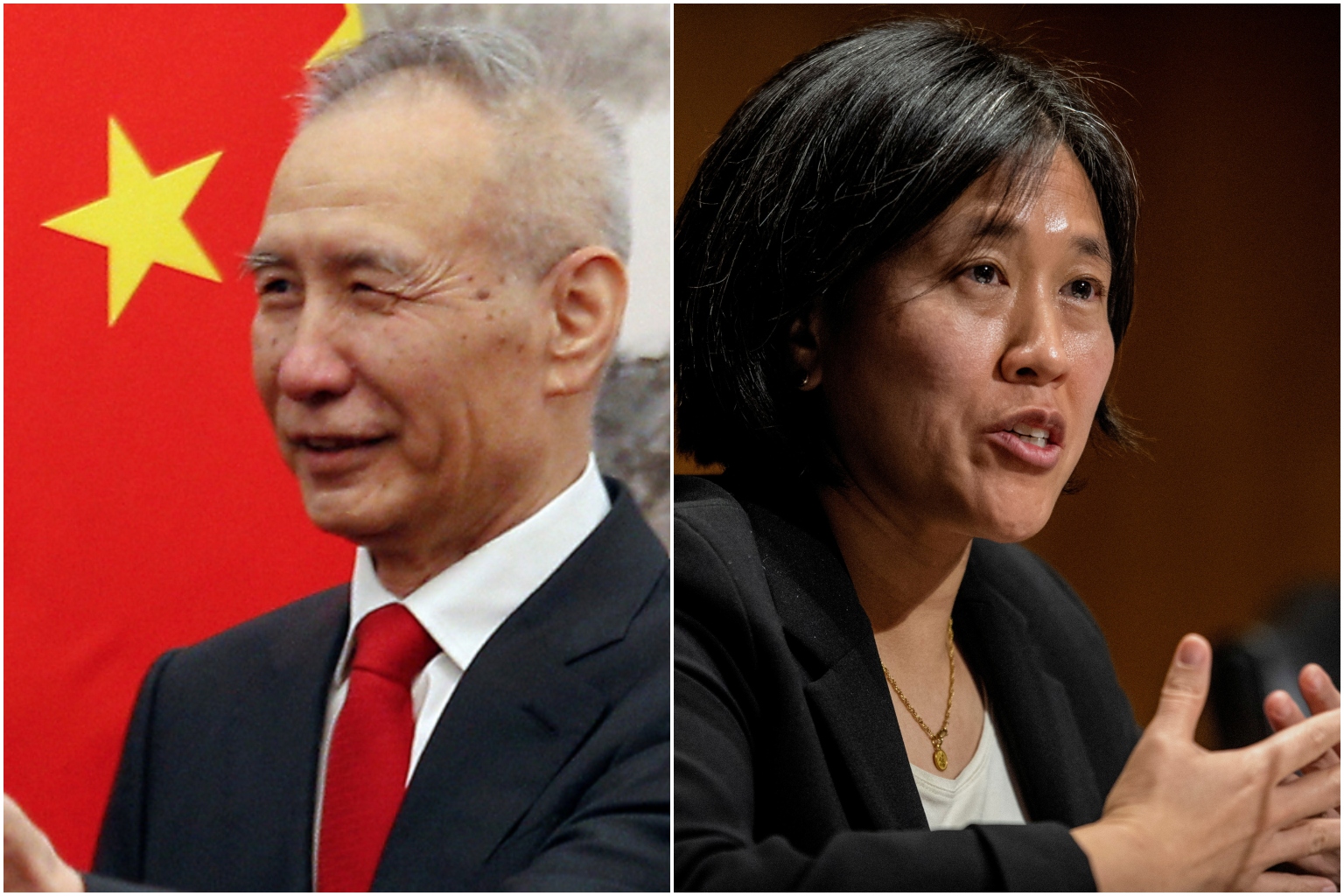US-China trade negotiators hold first phone call under Biden administration
Sign up now: Get insights on Asia's fast-moving developments

China's Vice-Premier Liu He (left) spoke with US Trade Representative Katherine Tai on May 27, 2021.
PHOTOS: REUTERS
Follow topic:
BEIJING - Top Chinese and American trade negotiators on Thursday (May 27) held their first telephone call since the Biden administration came to power in the US, in what analysts said was a positive sign that the world's two largest economies were moving towards tackling trade issues.
China's Commerce Ministry said in a statement on Thursday morning that the talks between Vice-Premier Liu He and US Trade Representative Katherine Tai were "candid, pragmatic and constructive".
"The two sides believe that the development of bilateral trade is very important and exchanged views on issues of mutual concern and agreed to continue to communicate," said the statement.
It also said the exchange was conducted on the basis of "equality and mutual respect" - using language that Beijing often employs when it calls for more positive communication.
In its statement on the phone call, Washington had also called the exchange "candid", and said Ms Tai had "discussed the guiding principles of the Biden-Harris administration's worker-centred trade policy and her ongoing review of the US-China trade relationship, while also raising issues of concern".
It also added that Ms Tai was "looking forward" to future discussions with Mr Liu.
Neither side had mentioned trade tariffs or the phase one trade deal that both sides had signed in January last year.
In an interview with Reuters before her call with Mr Liu, Ms Tai said the US continues to face "very large challenges" in its trade and economic relationship with China, which requires attention across the Biden administration.
"The overall challenges that we have with China are also still there and they are very large," Ms Tai said.
The last time trade negotiators from both sides spoke was in August last year.
Dr Wang Huiyao, president of Centre for China and Globalisation, a Beijing-based non-governmental think-tank, said the phone call was a sign of goodwill and a positive signal that both sides wanted to get down to business on trade.
But he added that trade tariffs will continue to be a major sticking point for China even though they were not mentioned in the official statements.
"Both China and many US companies want the tariffs removed. Biden also says that he supports multilateralism... These unilateral tariffs are not in line with his multilateral policy - hopefully this can be resolved," he said.
Taoran Notes, a blog run by the state-owned Economic Daily newspaper, said the call was proof of the "important role" that trade and economic cooperation played in stabilising the US-China relationship.
That Beijing had characterised the call as "constructive" indicated that both sides were forward looking and not fixated on problems in the past, it said.
Trade is a thorny issue between the US and China - both sides had been engaged in a two-year trade war that began during the Trump administration.
The hostilities were put on hold when the phase one deal was inked last year, which commits China to buying at least US$200 billion (S$265 billion) more of American agricultural goods, energy and manufactured products over two years.
In return, Washington would cut tariffs on US$120 billion worth of Chinese exports.
But the deal leaves in place the 25 per cent tariff on another US$250 billion of Chinese goods.
Chinese officials have called for the "unreasonable tariffs" to be removed, but the new Biden administration has said they would remain in place for now while it conducts a comprehensive review of the bilateral trade relationship.
At the moment, Beijing is running behind in its purchase commitments. Analysis from the Peterson Institute for International Economics showed that China needed to buy US$64.5 billion in the first four months of this year to stay on track of targets.
Instead, imports of covered products under the deal were 73 per cent of that - US$47.1 billion, based on Chinese data.
If US export figures are used instead, the number drops to 60 per cent - US$34.5 billion.
Responding to a question about how China has been speeding up its purchases of American corn this month and whether this meant China was still serious about its commitments under the phase one trade deal, Chinese Commerce Ministry spokesman Gao Feng said both sides must "work together to create the atmosphere and conditions, to push for implementation of the agreement".

